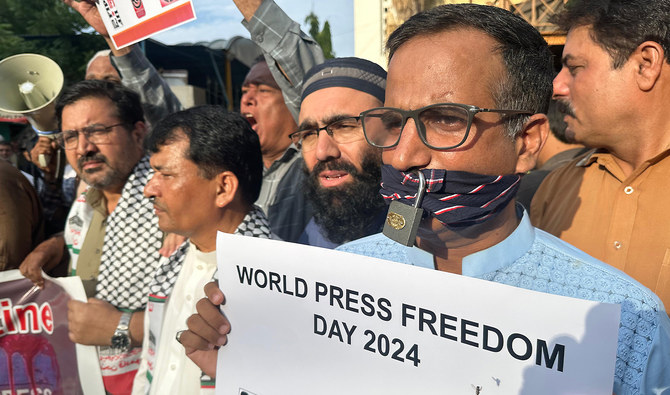ISLAMABAD: A leading global advocacy group for journalists’ rights on Friday highlighted alarming challenges faced by the media in Pakistan on Friday, saying that more than 300 people associated with the information industry faced repressive state tactics designed to quell dissent during the course of about a year.
The International Federation of Journalists (IFJ) released its country report on Pakistan on World Press Freedom Day that falls on May 3.
The report highlighted the persistent threats to freedom of expression, safety concerns, gender inequality, and the impact of disinformation on the local media industry.
“Over 300 journalists and bloggers this year were affected by state coercion and targeted, including dozens of journalists arrested for durations between several hours to four weeks and nearly 60 served legal notices or summons for their journalism work or personal dissent online,” the IFJ Pakistan country report for 2023-2024 said. “At least eight were charged for alleged sedition, terrorism and incitement to violence – all serious charges carrying lengthy sentences and even the death penalty.”
It maintained that most of these cases stemmed from the perceived or actual support of these journalists for former prime minister Imran Khan and his political party.
“In this sense, the principal threat actor behind crimes against journalists and free speech practitioners was undoubtedly the state and its functionaries, though some regional sects, non-state actors and gangsters were also involved in some cases,” the report added.
The IFJ described the judicial intervention in these matters as “the silver lining,” saying it thwarted the government’s attempts to entangle journalists “in legal proceedings as a tool of deterring dissent.”
The report noted four journalists were killed during the period under review while at least 59 journalists and bloggers were charged with sedition, terrorism, incitement to violence, defamation or contempt.
“Of these, 47 journalists were served legal summons to respond to allegations of targeted defamation and incitement against judges of the superior judiciary,” it continued.
The report also maintained the safety of women journalists in Pakistan’s online and offline spaces remained a persistent challenge.
“They continued to face gender-based discrimination, journalism work-related intimidation and under-representation in the industry,” it said.
The IFJ said this environment led to self-censorship among journalists and media outlets, especially while writing on topics concerning religion and law.
It also highlighted the plight of Afghan journalists, saying nearly 200 of them had fled to Pakistan after the Taliban takeover in August 2021.
“In October 2023, Pakistan’s government unilaterally demanded that Afghan refugees return to Afghanistan, setting a deadline of one month before authorities began forced deportations,” it recalled. “Amongst the refugees were 200 journalists who had fled to Pakistan to escape stifling restrictions on free speech in Afghanistan.”
The organization said it had called for financial and legal assistance for these journalists to support their sustenance and freedom to report.
















